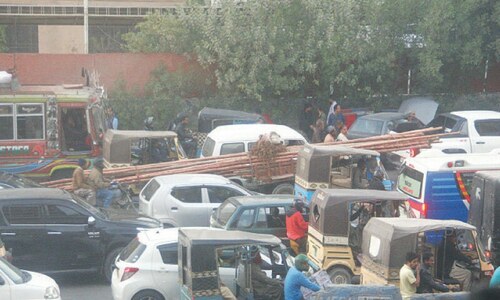KARACHI, Dec 16: Amid the persistent and growing trust deficit in South Asia, the need for establishing a South Asian parliament was considered necessary to bring together countries of the Saarc region.
“A healthy and prosperous South Asia must have a South Asian parliament that can deal with the greatest problem in South Asia: trust deficit,” said participants of a simulation exercise by students of International Relations of the various universities of Pakistan on Tuesday.
The first South Asian Association for Regional Cooperation simulation exercise was organised by the Department of International Relations of the University of Karachi in collaboration with the Hanns Seidel Foundation, Islamabad.
Participants of the group representing parliamentary affairs ministers of the eight Saarc member countries agreed upon the formation of a common South Asian parliament. This common parliament would help facilitate the process of economic and political integration.
Modelled after the European Union, the SAP would first act as a deliberative body for discussing all vitally relevant issues of concern to South Asians. It was suggested by one of the participants that the superstructure of the SAP should precede its infrastructure; the states are supposed to have shared values and norms and objectives for the running of the SAP.
Six out of the eight ‘ministers’ agreed upon a unicameral parliamentary institution whereas two – representing India and Afghanistan – differed and proposed a bicameral system. But during the consensus building session all voted – with fair representation of all – for a unicameral parliament. The ministers agreed upon turning this parliamentary body into an executive and legislative authority. It was interesting to note that while discussing the utopian idea of a South Asian parliament, which was first mooted by M.L. Sondhi of India in 1990, the participants remained oblivious of the fact that it was not possible to realise the objective as long as the region was beset with conflicts, the growing trust deficit and lack of regional trade.
The idea of a Saarc parliament was proposed by Mr Sondhi because he had felt that the “Saarc nations cannot afford the luxury of feeding old antagonisms and letting them become roadblocks in the evolution of the region into a community of prosperous nations at peace with themselves and with the world.”
Mr Sondhi also opined that it could become a modus vivendi on an issue like Kashmir, which is rendered more difficult in the absence of a regional legislature. It was felt that in such a context, a Saarc legislature could recognize and accommodate Kashmir’s interests within a cohesive regional unity and break the vicious circle by which both India and Pakistan undermine each other’s credibility.
Finally, the Saarc parliament should help fortify regionalism and multilateralism and through rational and open discourse work for the reduction of military budgets so that military expenditure can be reallocated for the purposes of socio-economic development.
Energy issues
Energy issues were also deliberated upon during Tuesday’s session. There was an exceptionally high degree of unanimity about coping with energy related issues and problems. It was realized that an enormous amount of power could be generated through collaborative efforts. According to one estimate, 140,000 megawatts of power could be generated if India, Pakistan and Bangladesh cooperatively start using the wind energy available to them by virtue of their vast yet hitherto unutilized coastlines.
The participants also emphasized the need for alternative sources of energy to meet the needs of growing populations. In this regard they proposed to make use of coal, which was a cheaper and indigenous source of energy. They collectively vowed to support and pursue the gas pipeline project that connects several countries of the region. Another realization on the part of the ministers was that hydro-power could be an alternative and cheaper energy source for producing electricity.
During the consensus building session, it was agreed that all the countries in the region would ready themselves for constructive engagement as far as the energy needs are concerned.
Saarc police
The third area covered during the session was Saarc police. The participants agreed upon forming a common Saarc police force to work for the collective fight against crime and lawlessness. There was consensus over the fact that drug trafficking, human trafficking, small arms proliferation and other such irregularities were posing a great threat to the well-being of all inhabitants of South Asia. It was, therefore, felt necessary to have a regional police force that would share intelligence etc.
The simulation exercise also included the education sector. The participants agreed to extend cooperation in this regard. In this context, it was also suggested that the smooth functioning of a Saarc University should be ensured because the bulk of the people in South Asia are severely and highly knowledge deficient.
There was general consensus as to making concerted and result-oriented efforts for not only raising the level of literacy but also sharing expertise in all possible fields of knowledge.















































Dear visitor, the comments section is undergoing an overhaul and will return soon.